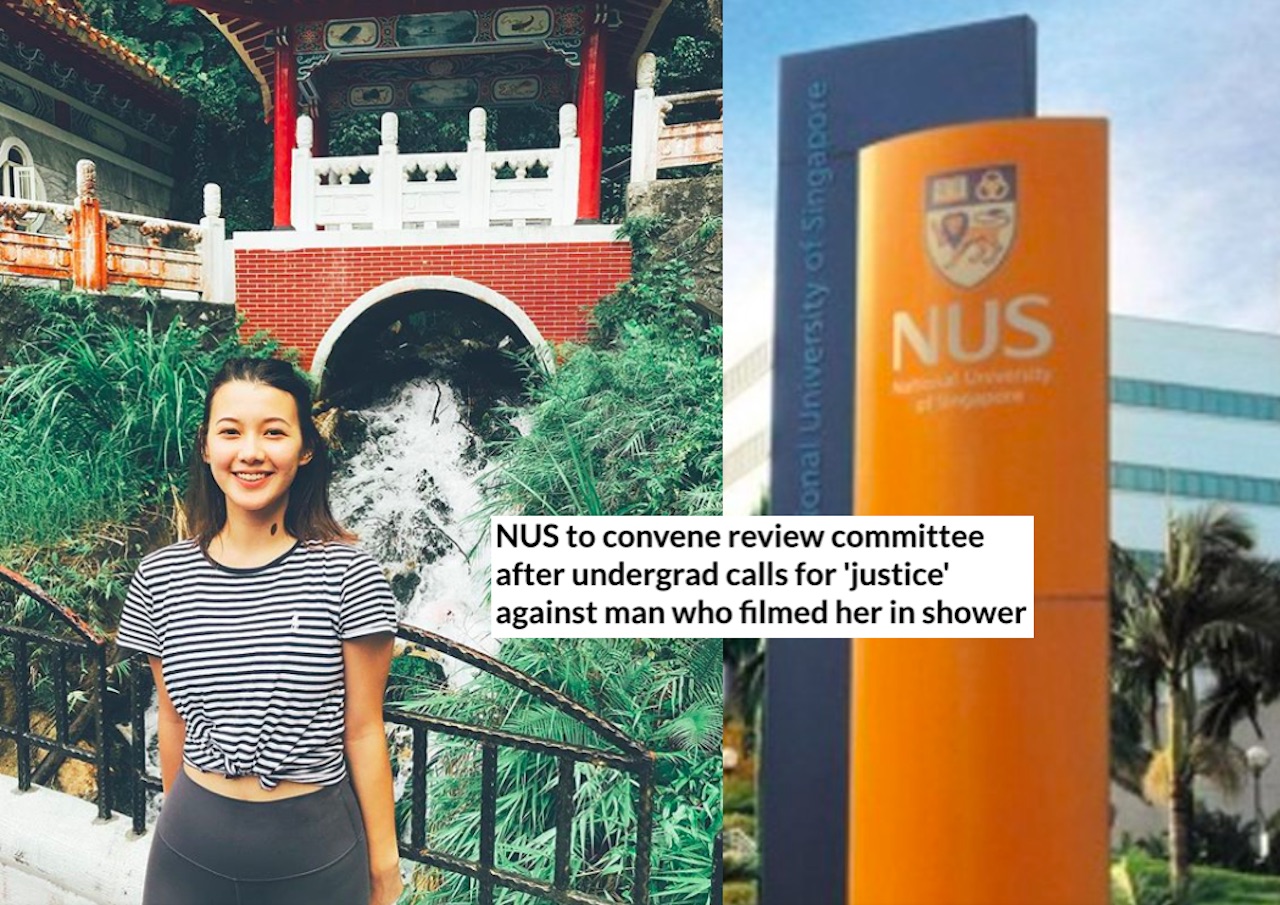On 19 April 2019, NUS student Monica Baey published a string of Instagram Stories about a fellow student, Nicholas Lim Jun Kai, who had filmed her showering in her hostel’s bathroom last November.
Immediately after the incident, Monica lodged a report with campus security on 25 November 2018, who simply requested for the police case number if she decided to proceed with a police report too. The following day, she went to the police.
Over the phone, Monica shares with me that after the police meted out their sentence for Nicholas (i.e. a 12-month conditional warning, because he was a first-time offender), they advised Monica to approach NUS if she wanted further action. She then provided NUS with her statement, WhatsApp conversations, and CCTV footage that documented how Nicholas had previously snuck into another toilet.
Within a day, NUS told Monica she’d sent them her statement “a bit late”, and that they’d already arrived at a punishment. They claimed they’d taken her statement into account, but said the outcome “would have been the same”.
For filming a female student in a toilet, Nicholas was suspended from school for one semester, banned from entering campus residences, and made to write Monica a compulsory apology letter and attend compulsory counselling sessions.
Monica questioned NUS if this was “all” that Nicholas was getting, since a one-semester suspension was akin to going on a Leave of Absence or Overseas Exchange, which was what many regular students did anyway. After all, men have previously been jailed for filming people in public toilets.
In other words, there was a disturbing lack of serious, visible consequence that would reassure female students the university would support them in cases of sexual misconduct, or warn potential perpetrators that they would be similarly punished.
NUS also told Monica this was the “most serious punishment [they] can give someone because it deters his graduation and he has to explain to his family and friends why he’s not in school”—almost as though he was the victim here, not her.
Moreover, NUS did not offer her any form of victim support throughout the investigation. The only time they brought up any concern for her well-being was to inform her that she could “just let [them] know” if she needed counselling.
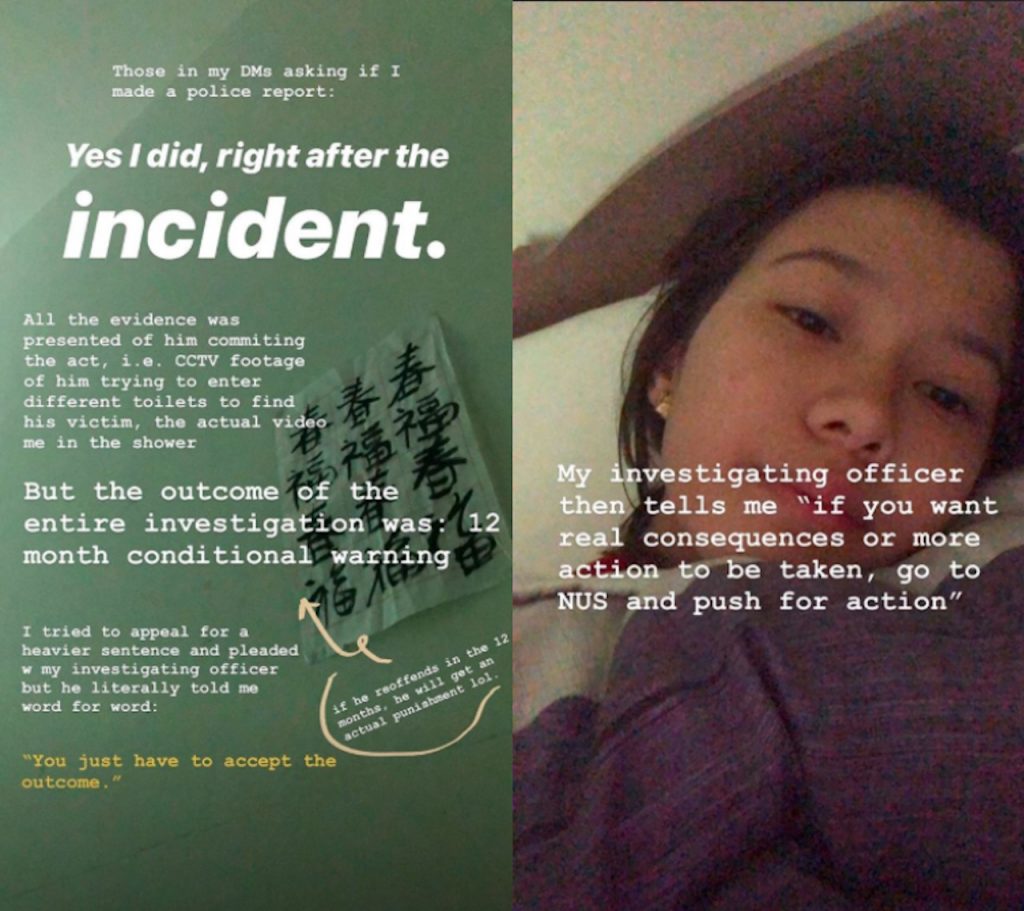
In February this year, the university emailed Monica the apology letter via Ms Esther Tan Peck Geok, who is the associate director and head of the Student Conduct Unit at the Registrar’s Office in NUS. This was the only email correspondence that NUS had with her. All previous correspondence took place over a phone call.
The full apology letter reads as follows (emphasis mine):
“Dear Monica,
I am Nicholas and I am writing this letter to formally apologise for my vile and inappropriate action that happened in Eusoff hall, on the final week of November and being on heavy alcoholic influence is no excuse at all. I am extremely ashamed of what I have done and I am so sorry to have traumatised you in such a manner, nobody should ever have to go through such a traumatic experience. I want to assure you that this will never happen to anyone else again, and I know actions speak louder than words. This incident has taught me an invaluable lesson and I will strive to be the best version of myself from here on. Of course I hope to seek your forgiveness, but I understand that I am in no position to ask for anything and you have no obligation to even give me any form of closure. But I still want you to know that I am really sorry to have committed such an offence. I will be serving the sanctions mete out by the university while bearing in mind to only improve as a person from here.
Sincerely,
Nicholas”
This is a blatant non-apology. Even though Nicholas signs off, the letter was approved by the university, and thus reflects NUS’ incompetence towards handling sexual misconduct.
A proper apology would be worded with specificity, because being able to pinpoint how one committed a crime and what its consequences were reflect a genuine understanding of the situation.
A proper apology would explicitly list the actions by the perpetrator, how exactly he believed these actions had affected the victim, the precise sanctions that he had received, and the detailed ways in which he planned to improve himself.
On the other hand, this letter contains generalities, such as “such a manner”, “invaluable lesson”, “such an offence”, and “what I have done”. These phrases are devoid of context and could be used to apologise for any incident.
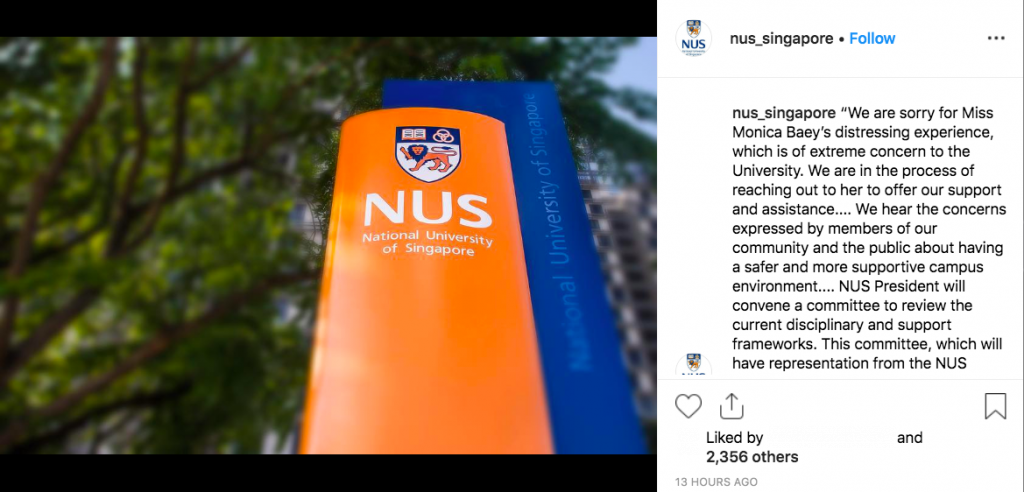
After reaching out to NUS with my questions on the way they handled the incident, the university referred me to their official statement (again, emphasis mine):
“20 April 2019
We are sorry for Miss Monica Baey’s distressing experience, which is of extreme concern to the University. We are in the process of reaching out to her to offer our support and assistance.
What has been committed is serious and investigated by the Police and we understand that the male student concerned received a 12-month conditional warning from the police.
When such offences are committed, the NUS Board of Discipline, which comprises student and faculty representatives, will also conduct its own disciplinary proceedings.
It will consider factors such as the severity of the offence, the need for justice for the victim, the rehabilitative needs of the student offender, the safety of the NUS community, and also the decisions and penalties imposed by the authorities.
We hear the concerns expressed by members of our community and the public about having a safer and more supportive campus environment, and recognise that advances in camera technology can be easily abused.
NUS President will convene a committee to review the current disciplinary and support frameworks. This committee, which will have representation from the NUS Board of Trustees, will study the approaches taken by other international institutions, and solicit views from various stakeholders. We expect to share the findings of the study and follow up actions in the new academic year.
Associate Professor Peter Pang
Dean of Students
National University of Singapore”
Similar to Nicholas’ letter, the university’s press statement is bereft of compassion and empathy.
The statement doesn’t identify what Nicholas did or what Monica went through. Instead, it’s riddled with vague phrases, such as “distressing experience”, “what has been committed”, “offer our support and assistance”, and “such offences”.
The statement doesn’t even state Nicholas’ name. By censoring the perpetrator’s name, NUS (and subsequent media reports) might believe they’re preventing a witch hunt, but this inadvertently belittles Monica’s story. When we protect perpetrators under seemingly good intentions, we must be aware that our silence doesn’t demonstrate support for victims.
In fact, it is the exact opposite.
Without his name printed, Monica is reduced to a victim who will be remembered for what was done to her. After all, a significant part of closure is being able to name her perpetrator.
Unfortunately, for an institution that prides itself in educating the youth of tomorrow, NUS possesses zero understanding and language to talk about sexual misconduct—an issue that youth increasingly feel neither fear nor shame in speaking up about.
Moreover, the board’s first response was to “convene a committee”, as though a team of adults were too cowardly to make a moral decision without resorting to bureaucracy.
Then, to say the committee would “study the approaches taken by other international institutions” and “solicit views from various stakeholders”, implies that sexual harassment isn’t considered a serious crime by the university. If it was, they would have already dealt out the necessary action; the only feedback they should listen to is the victims’.
The university’s interactions with Monica and their press release reflect a fundamental lack of moral authority. This is exacerbated by their outdated view of the current generation of youth, the issues they care about, how they engage with the world, and how they empower themselves through social media.
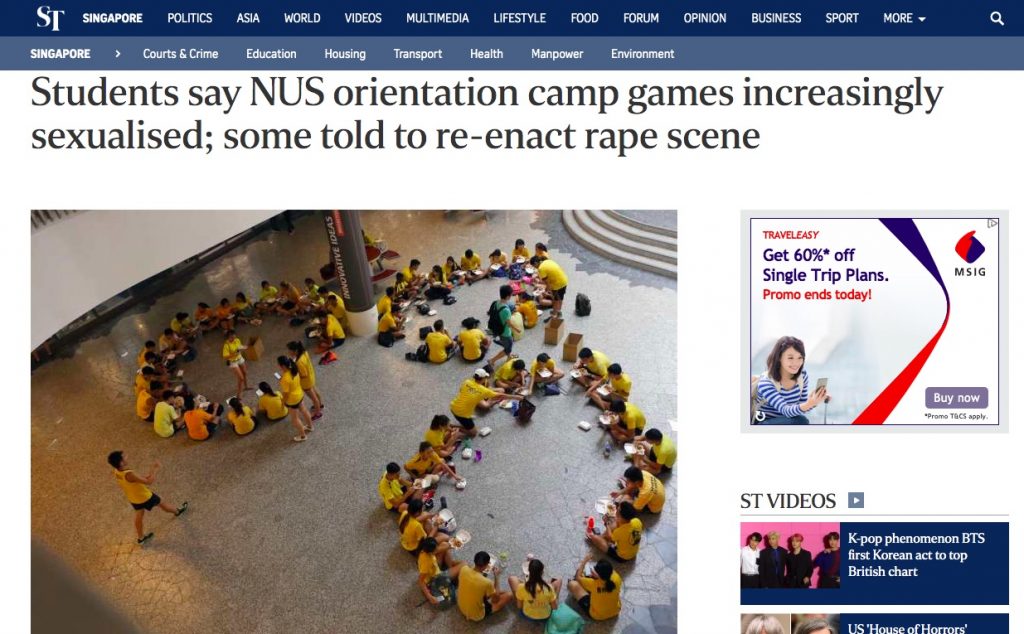
In 2008, female students were reportedly made to lie down during orientation games, while male students did push-ups over them. In 2014, NUS had to remind its students that “all forms of ragging were unacceptable”, after receiving a complaint from the aunt of a 21-year-old male undergraduate, who said a girl was made to “lick whipped cream off his neck, his nipples and also rub her hands on his thigh”.
The other most recent incident of sexual misconduct happened in 2016: NUS received reports on its “increasingly sexualised” orientation games, including one that required students to act out a rape scene as part of the forfeit. In response to the public backlash, the university stated that they “do not condone any behaviour or activity that denigrates the dignity of individuals, and that has sexual connotations”.
The university added, “If [students] decide to opt out of an activity, their wishes must be respected.”
Back then, the tone-deaf response ruffled a few feathers, though the social media backlash and support weren’t as potent as it was with Monica’s case. Even so, the ambiguous and token responses have carried forth to this day.
A world-class university with a third-world handling of sexual misconduct is unmistakably out of touch with the world. It is simply a microcosm of an outmoded patriarchal society, willfully blind to its own privilege, at the expense of their vulnerable communities.
For an institution that prides itself on giving their students an excellent education, NUS must protect students who are victims of sexual violence, and provide them with legitimate avenues of support.
In Monica’s case, she feels like the university tried to silence her by reminding her that the punishment meted out to Nicholas was the final outcome she would receive.
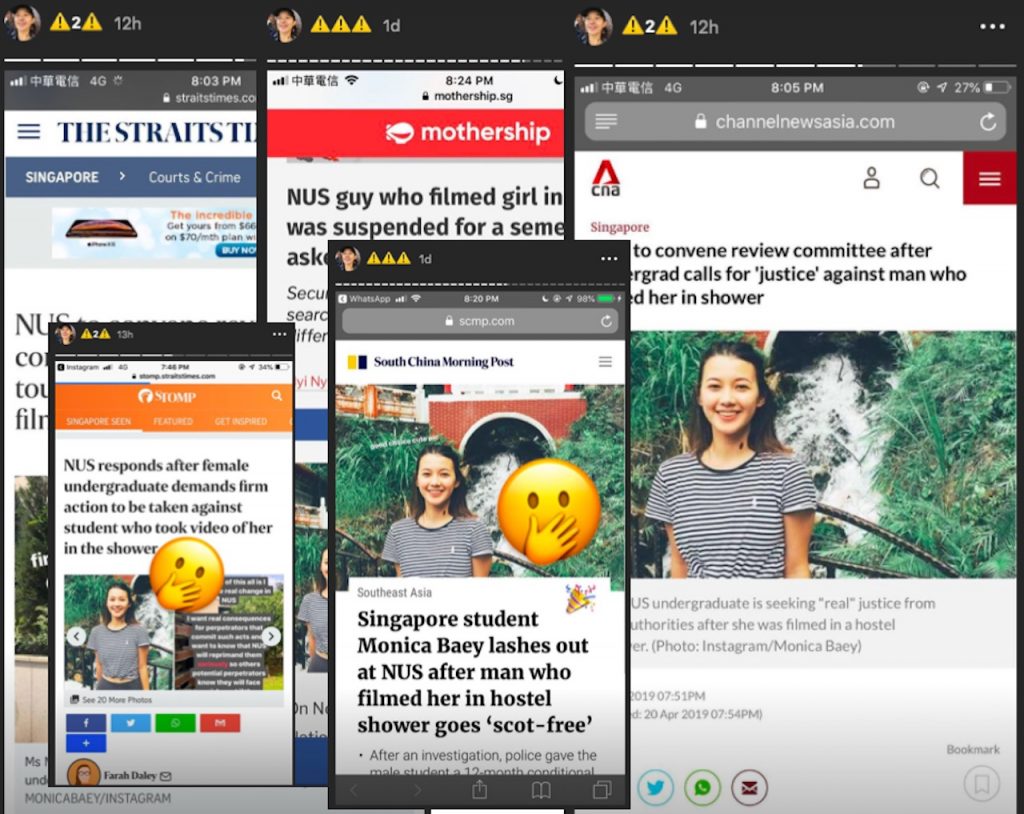
The only difference between what happened to Monica and other cases of sexual misconduct was that she knew how to leverage the power of social media to seek recourse when the institutions that are supposed to protect women failed to do their job.
After Monica had suffered in silence for a few months, she saw no point in being quiet anymore, especially when her perpetrator was “living his life publicly”. So she turned to IG Stories.
With each IG Story, her message is clear and consistent: she wants to see a change in the way NUS handles cases of sexual misconduct.
First, explicit ‘No Tolerance’ campus policies to protect female students. This includes visible and public punishment to deter future perpetrators and reassure female students that the school has their back.
Monica also shares that foreign students have told her that if this had happened the US or Poland, the perpetrator would get expelled right away. Even though NUS told her they “don’t tolerate anything like student misconduct issues”, their punishment appears to be a mere ‘slap on the wrist’.
She clarifies that visible and public punishment doesn’t mean shaming the perpetrator. Instead, it’s about making sure the student population knows the name of the perpetrator, what the school is doing to punish them, how the victim is being protected, and the support the school would give if the incident happens again.
Second, more security in communal bathing facilities beyond the existing CCTVs. Although this isn’t something she wants to push for because she believes that society needs to learn how to treat women better without being handheld or surveilled, it would help if female students needed a card to access the female toilets.
Finally, formal channels for victim support, such as a special body in NUS that’s dedicated to managing sexual misconduct or sexual harassment issues. While current counsellors might be qualified, Monica informs me they’re not specialised in sexual violence, harassment, or assault.
This specialised body for victim support would provide women with a safe space to be open about the exact sexual harassment and/or assault they face, and give them the support that she didn’t receive.
Since Monica released her IG Stories yesterday, almost every local news outlet has covered the story in the same way. From a case that could have been swept under the rug to a national issue, perhaps the silver lining in this debacle is the ingenuity of this younger generation in using social media to tell their stories and control their narratives.
Judging from NUS’ responses over the last decade to cases of sexual misconduct, the recurrent lack of empathy only reveals that the university still doesn’t get how the world is changing. The school might still believe that the media will remain impartial; that they can still have the final say over how women’s bodies are protected.
To be fair, they might be right.
But the tide is changing. Institutions like NUS, and men like Nicholas Lim Jun Kai, may not have expected a single, sweeping factor to alter everything—the unequivocal courage of a woman who decides she will no longer be silent.
They would do well to remember this: her body, her rules.
Have something to say about this story? Write in: grace@ricemedia.co or community@ricemedia.co.
